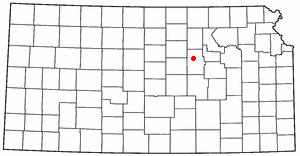Abilene, Kansas
|
|
Abilene is a city located in Dickinson County, Kansas, United States. As of the 2000 census, the city had a total population of 6,543. It is the county seat of Dickinson CountyTemplate:GR.
| Contents |
Geography
Abilene is located at 38°55'11" North, 97°13'2" West (38.919721, -97.217329)Template:GR.
According to the United States Census Bureau, the city has a total area of 10.7 km² (4.1 mi²). 10.7 km² (4.1 mi²) of it is land and none of it is covered by water.
Abilene's sister city is Minori, Japan.
Landmarks
- Eisenhower Presidential Center and the Dwight D. Eisenhower Presidential Library and Museum [1] (http://www.eisenhower.utexas.edu/)
- State of Kansas Sports Hall of Fame
- Greyhound Hall of Fame
- Hall of Generals - A wax museum of figures of generals from World War II
- Old Abilene Town and Museum - A replica of a part of old Abilene. [2] (http://www.oldabilenetownks.com/)
- Seelye Mansion and Museum - A Georgian style mansion built in 1905 at a cost of $55,000. The 25 room mansion contains the original furniture and Edison light fixtures. The Patent Medicine Museum contains many artifacts of the A.B. Seelye Medical Company. [3] (http://www.seelyemansion.com/)
- Heritage Center of Dickinson County - Two museums including the Historical Museum and the Museum of Independent Telephony. The Museum of Independent Telephony tells the story of C.L. Brown, whose independent Brown Telephone Company grew to become the telecommunications company known today as Sprint [4] (http://www.abilenecityhall.com/telephony.htm). [5] (http://www.heritagecenterdk.com/)
Demographics
As of the censusTemplate:GR of 2000, there are 6,543 people, 2,836 households, and 1,772 families residing in the city. The population density is 611.7/km² (1,584.7/mi²). There are 3,104 housing units at an average density of 290.2/km² (751.8/mi²). The racial makeup of the city is 95.52% White, 1.01% African American, 0.52% Native American, 0.38% Asian, 0.00% Pacific Islander, 0.96% from other races, and 1.60% from two or more races. 2.72% of the population are Hispanic or Latino of any race.
There are 2,836 households out of which 29.0% have children under the age of 18 living with them, 50.5% are married couples living together, 9.0% have a female householder with no husband present, and 37.5% are non-families. 34.2% of all households are made up of individuals and 17.2% have someone living alone who is 65 years of age or older. The average household size is 2.27 and the average family size is 2.90.
In the city the population is spread out with 24.7% under the age of 18, 7.0% from 18 to 24, 26.5% from 25 to 44, 21.7% from 45 to 64, and 20.0% who are 65 years of age or older. The median age is 40 years. For every 100 females there are 89.2 males. For every 100 females age 18 and over, there are 85.4 males.
The median income for a household in the city is $33,778, and the median income for a family is $46,052. Males have a median income of $31,971 versus $17,361 for females. The per capita income for the city is $17,356. 7.3% of the population and 4.8% of families are below the poverty line. Out of the total population, 7.2% of those under the age of 18 and 14.9% of those 65 and older are living below the poverty line.
History
Abilene began as a stage coach stop in 1857 founded by Timothy and Eliza Hersey. The name, taken from a passage in the bible, means city of the plains. The town grew quickly when Joseph G. McCoy decided to use the town for the location of his stockyards.
With the railroad pushing west and the cattle traders soon used Abilene as the largest stockyards west of Kansas City. The Chisholm Trail ended in Abilene and brought in many travelers and made Abilene one of the wildest towns in the west.
Wild Bill Hickok became marshal of Abilene for a short time in April of 1871. His time as marshal was short lived when, in a shoot-out with Phil Coe, he accidently shot his friend and deputy, Mike Williams by mistake. He lost his job two months later in December.
In 1890, Dr. A.B. Seelye founded the A.B. Seelye Medical Company. Dr Seelye developed over 100 products for the company including "Wasa-Tusa," an Indian name meaning to heal.
Abilene became home to Dwight D. Eisenhower when his family moved to Abilene from Denison, Texas in 1892 where he attended elementary school through high school. The Dwight D. Eisenhower Presidential Library is located in Abilene. It is now the final resting place for President Eisenhower, his wife, Mamie, and one son.
External links
Template:Mapit-US-cityscalede:Abilene (Kansas) ja:アビリーン (カンザス州)

